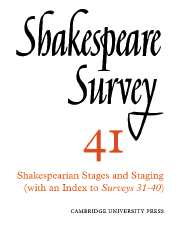Book contents
- Frontmatter
- The Shakespearian Stages, Forty Years On
- The Original Staging of The First Part of the Contention (1594)
- Charles Calvert’s Henry V
- Hamlet, An Apology for Actors, and The Sign of the Globe
- ‘Hid indeed within the centre’: The Hall/Finney Hamlet
- Malvolio and the Dark House
- The Text of Cressida and Every Ticklish Reader: Troilus and Cressida, The Greek Camp Scene
- Antony and Cleopatra, Act 4 Scene 16: ‘A Heavy Sight’
- The Tempest’s Tempest at Blackfriars
- Keats and Lucrece
- The Resources of Characterization in Othello
- Ovid and the Mature Tragedies: Metamorphosis in Othello and King Lear
- The Passing of King Lear
- Shakespeare Performances in London and Stratford-upon-Avon, 1986–7
- Professional Shakespeare Productions in the British Isles, January–December 1986
- The Year's Contributions to Shakespeare Studies: 1 Critical Studies
- 2 Shakespeare’s Life, Times, and Stage
- 3 Editions and Textual Studies
- Books Received
- Index to Volume 41
- General Index to Volumes 31-40
The Year's Contributions to Shakespeare Studies: 1 - Critical Studies
Published online by Cambridge University Press: 28 March 2007
- Frontmatter
- The Shakespearian Stages, Forty Years On
- The Original Staging of The First Part of the Contention (1594)
- Charles Calvert’s Henry V
- Hamlet, An Apology for Actors, and The Sign of the Globe
- ‘Hid indeed within the centre’: The Hall/Finney Hamlet
- Malvolio and the Dark House
- The Text of Cressida and Every Ticklish Reader: Troilus and Cressida, The Greek Camp Scene
- Antony and Cleopatra, Act 4 Scene 16: ‘A Heavy Sight’
- The Tempest’s Tempest at Blackfriars
- Keats and Lucrece
- The Resources of Characterization in Othello
- Ovid and the Mature Tragedies: Metamorphosis in Othello and King Lear
- The Passing of King Lear
- Shakespeare Performances in London and Stratford-upon-Avon, 1986–7
- Professional Shakespeare Productions in the British Isles, January–December 1986
- The Year's Contributions to Shakespeare Studies: 1 Critical Studies
- 2 Shakespeare’s Life, Times, and Stage
- 3 Editions and Textual Studies
- Books Received
- Index to Volume 41
- General Index to Volumes 31-40
Summary
OLD TIMERS
On anybody's list of great Shakespearians of the mid-twentieth century there would surely figure three names above all: C. L. Barber, Northrop Frye, and G. Wilson Knight.
C. L. Barber did not live to complete The Whole Journey: Shakespeare's Power of Development (Berkeley and Los Angeles: University of California Press, 1986), and it fell to Richard P. Wheeler to prepare with painstaking care the manuscript documents for publication. It is tragic that Barber did not see the result, for it is his own 'whole journey' traced through the entire Shakespearian canon. He was loved and respected as a teacher and critic, and one can see the underlying reason for this in the nostalgic attractiveness of his assumptions concerning 'Shakespeare's ideal of a gracious, organic society' (p. 124) and its violation in plays like Richard III and Titus Andronicus. Barber retrieves an image of Shakespeare as generous, 'richly sociable', and empathetic, and whether or not these qualities lay in the dramatist, they belonged to the critic. He accounts for Shakespeare in predominantly psychological terms. Shakespeare's experiences of witnessing the worldly failure of a lovable father, and being cherished by a strong mother, who was inadvertently betrayed by the weakness of her husband, are seen to feed into patterns in the plays which are regarded as an evolving canon. The pattern is implicit in The Comedy of Errors as the intact family is refound, but in 'the whole journey' different aspects become prominent at different times.
- Type
- Chapter
- Information
- Shakespeare Survey , pp. 193 - 214Publisher: Cambridge University PressPrint publication year: 1989

